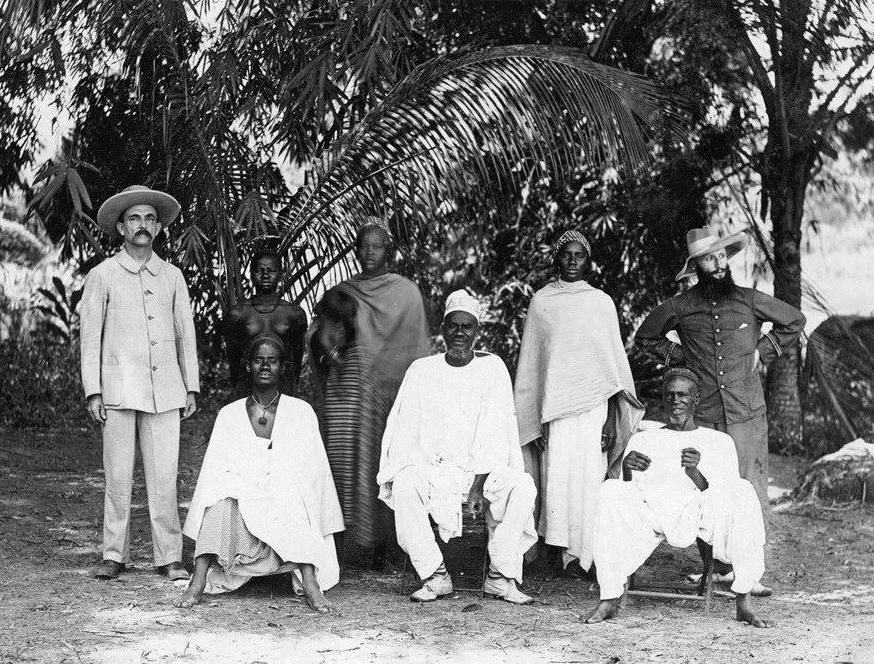
Islamic Wassoulou/Mandinkan Empire (1878-98)

Figure 1.--This portrait of Samory Touré and his French colonial captors was taken in Ndjole, Gabon, about 1899. Touré led an Islamic jihad against the French in the western Saharn area in what is now Guinea and Mali. After his defeat he was exiled to Gabon. He is seated in the center with his son and his former prime minister. The French men are Dr. Darden and Mr. Lemercier, chief of the post service. ore interesting are the three women in the back. The women in the center and in the right side are Toure's wives. Islam permits multiple wives and the French did not interfere here. The wife in the center hold's Touré's last child. Clearly a man of remarkable stamina. Notice that the woman at the left is bare breasted and bare headed. We suspect that given the French anti-slavery campaign that Touré described her as a third wife. Whether they believed that or nit we are not sure. But given Muslim modesty rules, she almost certainly was a slave. Modesty rules were commonly waived for slaves. Touré's Islamic jihad was in part motivated by French efforts to stamp out slavery and Muslim efforts to retain traditional practices like slavery. Muslim rules also permitted slave owners to have intercourse with their slaves. A reader writes, "I also think that the shirtless woman was a slave. While the free women have to cover the whole body (except face, hands and feet), the slave women were required by Islamic scholars to cover only the pelvis. It seems that the bare breast was a public sign of slavery." Just how aware Toure's French captors were of this we do not know. In Gabon because it was not a Muslim majority area, a lot of native women commonly went bare breasted at the time. another factor is that there was never an abolitionist movement in the Muslim world and in many areas slaves were not primarily used for plantation labor as was usually the case in the Americas.
|
|
One of the major Muslim resistance efforts to French rule was led by Samory Touré (c1830-1900). His resistance was centered in the western area of what became French West Africa, in the area around what is modern Mali, but including portions of several neighboring countries. Touré founded the the Islamic Wassoulou Empire, also referred to as the Mandinkan Enpire. He proved to be a major impediment to French rule. An important issue for Touré and other Muslim leaderes was slavery. They resisted French efforts to stamp out the slave trade and slavery itself. This was an important part of the ecomomy of the Muslim states and many of their supporters believed it was santioned by the Koran, with some justification. Touré's Empire was forged around the Dyula (Dioula or Juula) people. The Dyulka were a merchant caste of the Mande tribe or ethnic group. They were centered in Mali, but also found in Cote d'Ivoire, Ghana, Burkina Faso, and Guinea-Bissau. El Hajj Umar Tall died near Bandiagara (1864). This left his Toucouleur Empire without a strong sucessor.
The chiefs he had dominated and brought into his Empire saw an opportunity to break away, perhaps more accurarely called a tribal federation, and establish independent kingdoms. Samori Touré was one of these chiefs who proved especially prominent. His Kingdom was located in modern southwestern Guinea bordering Mali. Touré not only achieved independence, but laumnched his own Islamic juhad and began building his own Muslim empire (1878). Touré ammased a substantial standing jihadist army with both infantry and cavalry. The infantry was called 'sofa' and consisted of many Mandinka slaves. There was also a well-trained cavalry force. One reports suggests that Touré could field more than 30,000 infantry and some 3,000 cavalry. [Boahen] Touré's army was a major challenge to the French because they had acquired modern Europen arms, although no effective artillery. We are not sure how he obtained arms, perhaps through sympthetic Muslim supporters in North Africa. Morocco had especially close ties to Mali. The French finally defeated Touré (1898). They sentenced him to exile in Gabon far from the Muslim Saharan areas where he had raised his army. He was exiled along with his son (Saranke-Mory) and his prime minister Morifidian Diabaté. He had several wives and quite a number of sons. The sons were sentenced to obligatory residence in Timbuktu and Niaro. Toure died in Gabon of a pneumonia (June 2, 1900). [Dilley, pp. 136-37.]
Sources
Boahen, Albert Adu. General History of Africa Vol. 7 "Africa under Colonial Domination 1880-1935" Abridged paperback. (1990).
Dilley, Roy. Nearly Native, Barely Civilized: Henri Gaden’s Journey through Colonial French Africa (1894-1939 (Brill, Leiden-Boston: 2014). , pgs. 136-137).
CIH

Navigate the Children in History Website:
[Return to Main French Scrable for Empire page]
[Return to Main National Empires in Africa page]
[Return to Main Scramble for Africa page]
[Return to Main French regions page]
[Return to Main Great Mali Empire page]
[Return to Main Mali history page]
[About Us]
[Introduction]
[Biographies]
[Chronology]
[Climatology]
[Clothing]
[Disease and Health]
[Economics]
[Freedom]
[Geography]
[History]
[Human Nature]
[Law]
[Nationalism]
[Presidents]
[Religion]
[Royalty]
[Science]
[Social Class]
[Bibliographies]
[Contributions]
[FAQs]
[Glossaries]
[Images]
[Links]
[Registration]
[Tools]
[Children in History Home]
Created: 1:35 PM 11/10/2015
Last updated: 5:28 PM 11/10/2015



